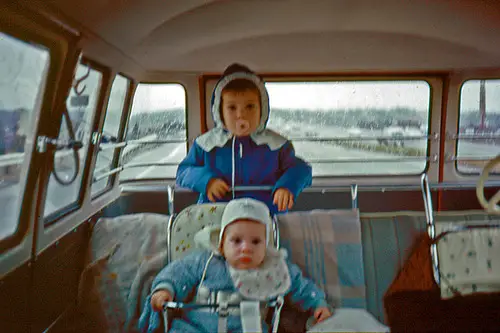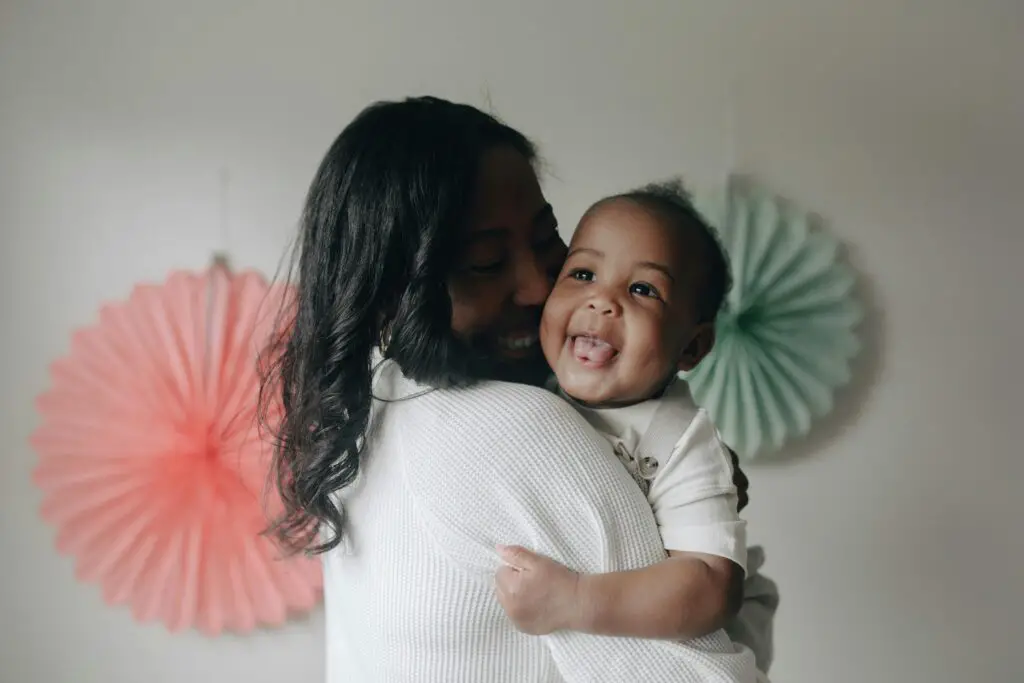1. Letting Babies Cry It Out for Hours

Back in the day, many parents believed in the “cry it out” method to toughen babies up. Some were told not to pick up their child too often, fearing they’d spoil them or create bad habits. New moms today are often horrified by stories of babies left alone in cribs for hours, crying themselves to sleep. There’s now a better understanding of how crucial emotional bonding and responsiveness are in the early months shares Parents.
Modern parents tend to prioritize building trust and security, which means comforting babies when they cry. Hearing that their own parents or grandparents ignored their cries as infants can feel almost unbelievable. For many new moms, the idea of not comforting a baby feels unnatural. These emotional connections are now seen as building blocks, not spoiling behavior says Newsweek.
2. Smoking Around Kids

It’s hard to believe now, but there was a time when lighting up a cigarette in the living room—or even in the car with the windows rolled up—was normal. Parents didn’t think twice about smoking with their children right beside them. Some even smoked during pregnancy, completely unaware of the risks shares Business Insider.
New moms today are often stunned by old family photos with ashtrays on the table and babies on laps. We now know that secondhand smoke can be incredibly harmful, especially to tiny lungs. Most parents today go to great lengths to avoid exposing their kids to smoke of any kind. What once was commonplace is now seen as reckless and dangerous adds CNN.
3. Skipping Car Seats

It wasn’t until the late ‘70s and early ‘80s that car seats became mandatory in many places. Before that, babies often rode in laps or loosely secured carriers that wouldn’t stand a chance in an accident. Many older relatives recall riding in the backseat completely unbuckled—or worse, in the front seat.
For new moms, the idea of driving without a properly installed car seat is terrifying. Safety standards have come a long way, and there’s now a wide range of car seats designed for every age and size. It’s shocking to hear stories of babies bouncing around in a moving car like it was no big deal. These days, car seat safety is one of the first lessons new parents learn.
4. Starting Solids Super Early

Years ago, some parents were encouraged to feed their babies cereal in a bottle at just a few weeks old. Pediatricians now know that tiny digestive systems aren’t ready for solids until around 4 to 6 months. But back then, it wasn’t uncommon to hear of newborns getting mashed potatoes or even meat puree by two months.
New moms today are much more cautious, often following updated guidance from doctors and nutritionists. There’s also a big emphasis now on letting babies show signs of readiness. Hearing older relatives say, “We gave you steak at three months, and you turned out fine!” can be both amusing and alarming. It’s a stark reminder of how much advice has changed.
5. Spanking as Discipline

Corporal punishment was once considered a normal part of parenting. Whether it was a quick swat on the behind or something more severe, many parents believed that spanking was the only way to teach right from wrong. It was even supported by schools and parenting books.
New moms today are much more likely to use gentle discipline methods like redirection or positive reinforcement. The idea of hitting a child feels jarring to many, especially with what we now know about childhood development and trauma. There’s also more awareness around emotional intelligence and teaching kids through example. Spanking is no longer seen as effective—or acceptable—in most circles.
6. Feeding Kids Sugar with Every Meal

In previous generations, sugar was everywhere—canned fruit in syrup, sugar-loaded cereals, and dessert after every dinner. Kids drank soda like water, and few people worried about things like daily sugar intake or long-term effects. It was just part of childhood.
Today’s moms are reading labels, limiting juice, and dodging sugary snacks with ninja-like precision. When they hear stories of toddlers getting coffee cake and cola at grandma’s house, they’re often shocked. It’s not about being overly strict, but about understanding how diet affects mood, sleep, and development. Times have changed, and so have our snack options.
7. Ignoring Mental Health

In past generations, things like postpartum depression were rarely talked about. New moms were expected to bounce back quickly, smile through exhaustion, and never admit they were struggling. Mental health wasn’t something that came up during pediatrician visits or family conversations.
Now, there’s much more openness around the emotional rollercoaster of parenthood. New moms are encouraged to speak up and seek support if they’re feeling overwhelmed. They’re also more likely to have access to therapy, community groups, and online forums. It’s shocking to think how many women suffered in silence just a generation or two ago.
8. Letting Toddlers Roam Unsupervised

There was a time when kids as young as 3 or 4 were allowed to play outside for hours with little to no supervision. Some parents believed that freedom built independence, and danger wasn’t as front-of-mind. Stories of walking to the store alone at age five or biking across town without a helmet were not uncommon.
Today’s new moms are far more hands-on, often keeping their eyes on their children at all times. They install baby gates, track every move with monitors, and stress about screen time and safety. It’s not about fear, but about prevention and protection. Hearing older folks reminisce about their “free-range” childhood can feel equal parts nostalgic and nerve-wracking.
9. Letting Kids Stay Up All Night

Bedtimes were often more flexible—or nonexistent—in some households. If a parent worked late or guests came over, kids might be allowed to stay up until midnight. Routine wasn’t always a priority, and sleep science certainly wasn’t a popular topic of conversation.
Nowadays, many parents are strict about bedtime routines, knowing how much children rely on consistency and rest. Sleep regression, nap schedules, and wind-down time are all part of the nightly ritual. When new moms hear that their parents just let them pass out on the couch, it’s hard to imagine doing the same. We’ve learned that sleep is a cornerstone of both behavior and health.
10. Downplaying Allergies

Not long ago, food allergies weren’t treated with the seriousness they are today. Kids were told to “just pick around” the peanuts or eat something anyway if it “only caused a rash.” There was little understanding of how severe some allergic reactions could be.
Now, allergy awareness is front and center, with schools banning common allergens and parents carrying EpiPens everywhere. New moms are often startled to learn how casually allergies were handled in the past. Even family members may joke, “We didn’t have all these allergies when you were little.” But today’s parents know better—and they know it can be a matter of life or death.
11. Gender-Stereotyped Parenting

In past decades, boys were told not to cry and girls were expected to help in the kitchen. Toys, clothes, and even behavior were heavily divided by gender. Emotional sensitivity in boys was discouraged, and ambition in girls could be seen as pushy.
New moms are now raising kids in a world that increasingly values emotional intelligence, inclusivity, and equality. They’re more mindful of the messages they send and the roles they reinforce. Seeing old ads with little girls playing house while boys build rockets can feel surreal. Parenting today often aims to nurture each child’s individuality rather than boxing them in.
12. Skipping Sunscreen Entirely

Generations ago, getting a “healthy tan” was all the rage, and sunscreen was an afterthought—if it was used at all. Babies were often left bare-skinned in the sun without protection, and sunburns were just part of summer.
New moms now know the long-term risks of sun exposure, including skin cancer and premature aging. They slather their kids with SPF 50, dress them in sun-protective clothing, and avoid peak UV hours. It’s hard to imagine leaving a baby out in the sun without even a hat. The contrast between past and present attitudes toward sun safety is one of the most dramatic shifts.
13. Brushing Off Safety Concerns

Whether it was sharp corners, unlocked cabinets, or unanchored furniture, household safety just wasn’t a major concern in many homes decades ago. Some parents believed kids needed to learn by trial and error, even if it meant a few scrapes along the way.
Today’s moms baby-proof like it’s a competitive sport, with outlet covers, corner bumpers, and toilet locks in every room. The idea of not securing a heavy dresser to the wall is unthinkable to many. It’s not about being paranoid—it’s about being prepared. For new parents, safety has become part of the daily routine.
14. Comparing Babies Constantly

Older generations often shared stories like, “Your cousin walked at nine months!” or “Your brother was potty trained by one.” There was a lot of pressure to meet milestones early, and comparisons were often shared freely.
Today’s moms are more focused on letting children develop at their own pace. They understand that every child is different and that pushing too hard can lead to stress and insecurity. Modern parenting leans more toward support and celebration rather than competition. Still, hearing those old comparisons can make new moms wince—and remind them how far we’ve come.
